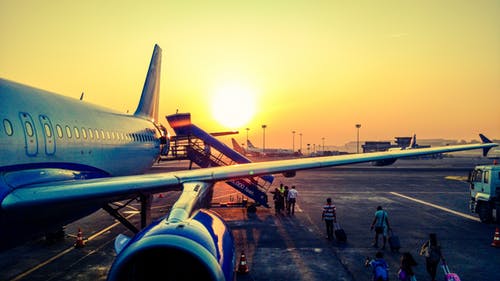
Fears about the coronavirus (also known as COVID-19) are causing people from all across the globe to alter their plans. Italy is essentially on lock down, and large group gatherings bans are leading to event cancellations in numerous areas. “Social distancing” is an increasingly common recommendation, encouraging people to maintain a minimum amount of physical space between each other.
Coronavirus Leads to Cheap Flights
As a result, many people are forgoing vacations, business trips, and other ventures away from home. And, as more people cancel their plane tickets, airlines are scrambling, offering shockingly cheap plane tickets to entire travelers to hit the skies.
The Availability of Cheap Flights
Right now, cheap flights abound. Many people are canceling tickets or skipping trips due to fears surrounding COVID-19. Flying means being in a relatively small space with dozens and dozens of people, not including crossing paths with strangers in airports. In hopes of limiting their exposure, people are choosing not to travel.
This leaves airlines in a bind. They have to drop prices if they are going to fill planes with passengers. Without amazing deals, people simply won’t take the risk.
As of March 11, a round trip flight for one person from Seattle to New York City costs as little as $112. That’s less than half of the usual price, which comes in near $300. From Miami, a person can get to and from Chicago for a mere $66, about $157 less than normal.
Travelers looking to go from Los Angeles to Washington D.C. could spend $66 for a single round-trip ticket. That’s $188 below the usual price, making it a discount of 74 percent.
International flight prices are also falling. For example, trips from Washington D.C. to London are coming in hundreds of dollars lower than usual on average, with some coming in just shy of the $400 mark. If you wanted to go from Boston to Barcelona, round-trip tickets are available for less than $200, a far cry from the usual $681.
Why People Are Buying the Cheap Tickets
In some cases, the low-cost airfare is working. Some people are taking advantage of the discounts and traveling to places that may otherwise be unaffordable.
This is especially true for younger adults who might not be able to shoulder travel expenses otherwise. Plus, COVID-19 seems to hit older populations harder, so healthy individuals in their 20s or 30s may feel like the potentially deadly disease isn’t as troublesome for them. That doesn’t mean they aren’t aware of the possible danger, only that they think the high-risk, high-reward travel scenario is worthwhile.
Flying Risks During the Coronavirus Outbreak
Generally speaking, the primary risk of traveling during the coronavirus outbreak is potential exposure. Airports bring people together from all over the world. Plus, due to their sheer size, they can’t be continuously sanitized from top to bottom at all times.
Planes have similar risks. However, they add on the potential to be in an enclosed space (with recirculating air) with a person who may be infected. A person may be contagious before symptoms appear, and some of those who get COVID-19 have mild symptoms that may not be highly noticeable to them or others.
Finally, when traveling overseas, new issues could arise. A person could be caught in a quarantine zone, unable to return to their home country as planned. Additionally, seeking medical care could be challenging, depending on the nation’s rules and overall service availability.
Ultimately, the coronavirus means there are airline deals to be had. It isn’t clear how long this situation will last or where COVID-19 will reach next, but if you are comfortable with the risks, then you might be able to save a bundle on your dream destination.
Since the coronavirus leads to cheap flights, would you consider vacationing now? Share your thoughts in the comments below.
Read More:
If you enjoy reading our blog posts and would like to try your hand at blogging, we have good news for you; you can do exactly that on Saving Advice. Just click here to get started.
Tamila McDonald is a U.S. Army veteran with 20 years of service, including five years as a military financial advisor. After retiring from the Army, she spent eight years as an AFCPE-certified personal financial advisor for wounded warriors and their families. Now she writes about personal finance and benefits programs for numerous financial websites.
Comments